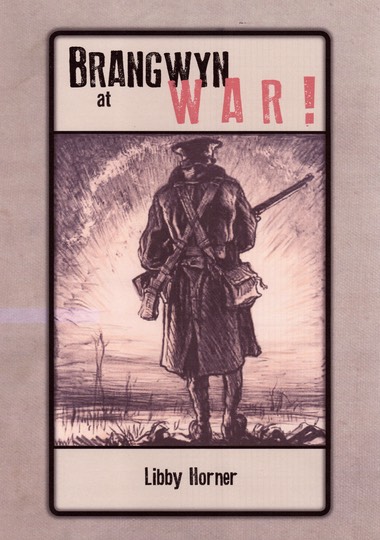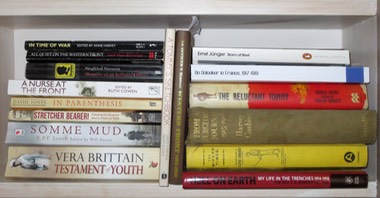(Libby)

A couple of days ago I actually finished my book Brangwyn at WAR! having worked on it for most of the last year, researching, writing and latterly designing and it’s a strange feeling of release. Suddenly I have twice the energy, excitement and enthusiasm to put into other projects and I’m gadding from one to another like a deranged butterfly (creating paintings, experimenting with eggshell mosaic, painting tiles for my Cambridge kitchen). I was so totally focussed and pre-occupied with the tome, it literally invested my every waking (and sleeping) hour – I must have been a bore to live with!

I guess it’s also a relief to turn to something joyous after my Great War immersion - the book deals mainly with Brangwyn’s 1914-1918 posters. Apart from the standard reference books, military and social histories, the art and architecture magazines’ take on the war’s progress, devastation of buildings, libraries, ‘Kultur’ – I tried to read as many war diaries as possible, especially those written at the front without thought of publication and those written by ordinary Tommies (not the officer class). Highly recommended would be Somme Mud by the Australian Private Edward Lynch who was only 18 years old when he set out for France and wrote about his experiences in 1921, probably hoping to exorcise his demons. Sister Edith Appleton wrote her diaries in between shifts and they were discovered by her great-nephews and nieces and finally published as A Nurse at the Front in 2012. The American Dr Harvey Cushing was also a diarist and despite his heavy work load and the realisation that he could be court-martialled for his efforts, maintained his journals throughout the war which were finally condensed into a fascinating and beautifully written book, From a Surgeon’s Journal 1915-1918 in 1936. Ernst Jünger’s Storm of Steel was one of the first Great War books to be published in 1920, a clear and almost apolitical account by a man who joined up on the first day of war, a mere nineteen years old. I’ve also aimed at trying to be apolitical in my book – not an apologist, but not coming down on one side or the other. As in most wars, mistakes were not the prerogative of one party, the leadership may be questionable but the soldiers are mere pawns, and as in medieval times both the Allies and Central Powers claimed that God was on their side. History is supposed to teach one lessons – we don’t appear to have learnt anything.
So – looking forward, next on the agenda is transcribing interviews for our Fiore film which has to be presentable if not finished by the end of May! Plus work on the Brangwyn’s War exhibition at The Mercer Gallery, Harrogate, which starts 17 May and for which I’m special advisor. Plus various other projects currently under wraps – so sufficient to keep me busy.